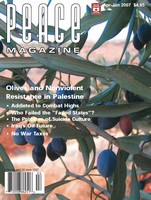
Peace Magazine Apr-Jun 2007, page 21. Some rights reserved.
Search for other articles by Andres Kahar here
The device of irony gives comics like Stephen Colbert a chance to say one thing but actually mean something altogether different
Truthiness (noun) 1 : truth that comes from the gut, not books. 2 : "the quality of preferring concepts or facts one wishes to be true, rather than concepts or facts known to be true" (American Dialect Society, January 2006).
Stephen Colbert coined the term "truthiness" for the October 2005 premiere of his TV show, The Colbert Report. It's a spin-off from The Daily Show with Jon Stewart, a popular fake-news show on cable's Comedy Central, carried by CTV here in Canada. In his own fake-news show, Stephen Colbert plays 'Stephen Colbert,' a know-little yet fiercely ideological conservative host/pundit in the mould of Fox TV's Bush-cheerleader Bill O'Reilly.
Colbert has described "truthiness" as a thesis statement for the show. And the term is emblematic: Little about 'Stephen Colbert' is as it seems. He is doing something daunting -- irony. With an average viewership of over 1.2 million, this funnyman has gained serious respectability. The "t" in Colbert is silent ("Col-BEAR"). After eight years as a fake-news correspondent, Stephen Colbert, alongside Daily Show producers, transformed a fictitious bumper for The Colbert Report -- the "t" in "report" is also silent ("re-PORE") -- into a full-fledged show.
It's postmodern comedy of high order. Colbert can play neoconservative 'Colbert' as he earnestly interviews a fellow neocon, who ends up surreptitiously skewered. 'Stephen Colbert,' the character, is mirroring the Bush administration. Like the architects of the bloodily failed Iraq War, 'Colbert' sees what he wants to see -- not reality.
This is the essence of "truthiness": in politics, perception matters more than facts. "Anyone can read the news to you," says 'Colbert' to his viewers. "I promise to feel the news at you."
And feel he does, with his oft-mentioned gut sense: 'Colbert' is a Christian, homophobic, by-the-bootstraps neoliberal, and a US military cheerleader. And he's irrationally opposed to bears, which he describes as soulless, Godless killing machines. Yes, this Second City alumnus plays for laughs. But, as last year's White House Correspondent Association Dinner guests discovered, Colbert is also a political man on a mission.
Inexplicably, Colbert was invited to be the keynote speaker/entertainer of the evening. With President George W. Bush just a few feet to his right, 'Stephen Colbert' took to the podium and delivered a hilarious and searing critique of the Bush administration. Addressing the president, Colbert deadpanned: "Reality has a well-known liberal bias." Just look up the video online, and you'll see: Bush tries to appear jovial and good-sported about it. But, the purse-lipped expression on his face is unmistakable: he's pissed-off.
Colbert was a fearless dog-with-a-bone that night. Among his many ironic swipes at power, 'Colbert' praised Bush for "standing for" things: "Not only for things -- he stands on things. Things like aircraft carriers and rubble and recently flooded city squares." Was this a case of cynical, even malicious, talent-booking? Or, maybe, the organizers really didn't anticipate the taste of a Colbert-flavored evening? After all, the emcee didn't even know enough not to pronounce the "t" in "Colbert." Many mainstream media reviews of Colbert's performance were critical: Colbert apparently overstepped; he behaved badly.
In a CBC interview months later, fellow comic Lewis Black (another Daily Show cast member) recounted his post-mortem with Jon Stewart: "Wow, that takes some balls... As a comedian, three minutes into it, we would've pissed our pants. We would've started back-pedaling..." Bu therein lies a rule of comedy: status is always ripe for dismantlement.
The Colbert Report is a burlesque on "personality journalism" -- diktats delivered by a celebrity. Whether it's Fox's Bill O'Reilly, MSNBC's Keith Olbermann, Harpers' Lewis Lapham, or even -- alas, sometimes -- Jon Stewart, the audience knows what message they're in for before the curtain rises. The result can be more of a smug nodding contest than an actual discourse in which anyone can be converted.
Make no mistake: Colbert's got a liberal bias. But his irony precludes nakedly didactic comedy: it's his buffoonish character who speaks, not him. But, still, despite Colbert's repeated protests that he's primarily after laughs, not a mission of politico-social change or influence, this 'aw shucks' claim is unconvincing. As Lewis Black suggested, it's no minor comic who has the cojones to lampoon the president of the United States frontally, in person. As Kay said to Michael Corleone in The Godfather III: "Now that you're respectable, I think you're more dangerous than ever."
Andres Kahar is a Toronto-based writer who feels that ironic people should start saying what they actually mean.

Peace Magazine Apr-Jun 2007, page 21. Some rights reserved.
Search for other articles by Andres Kahar here